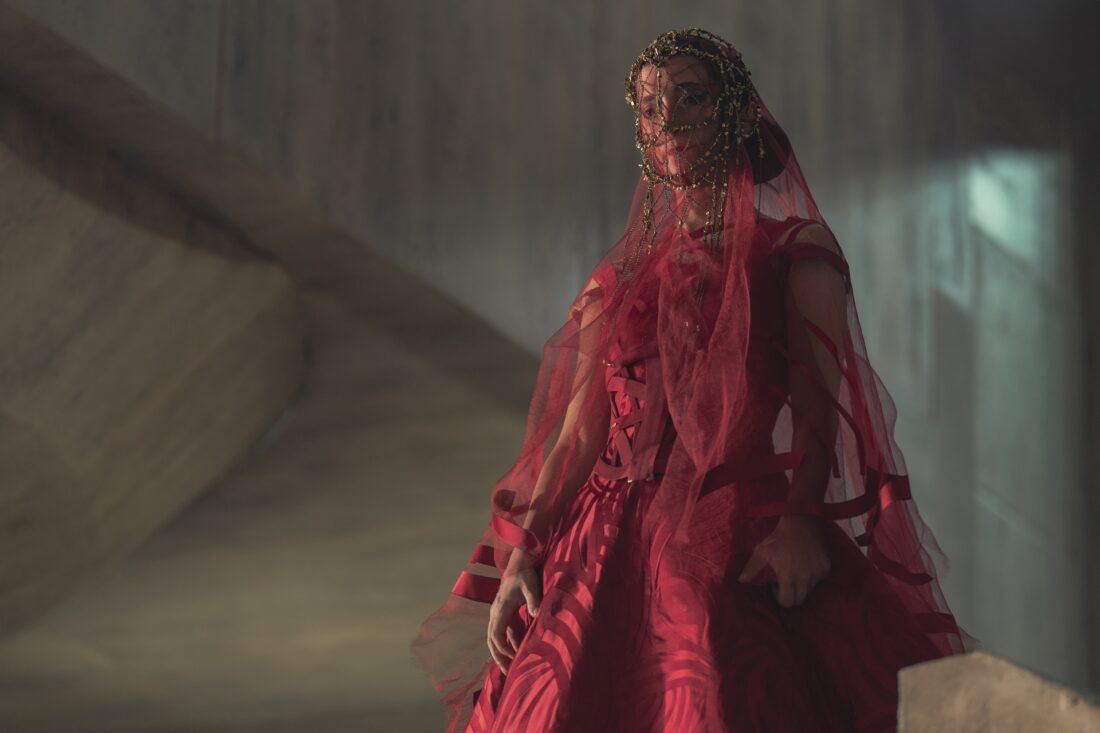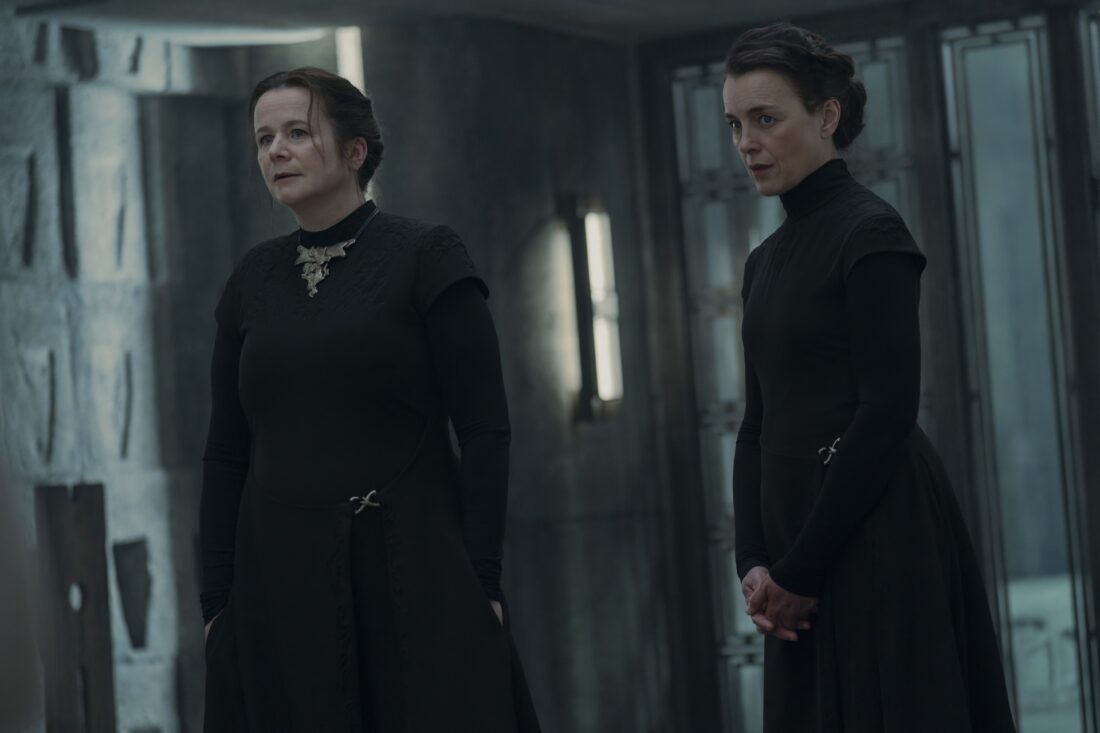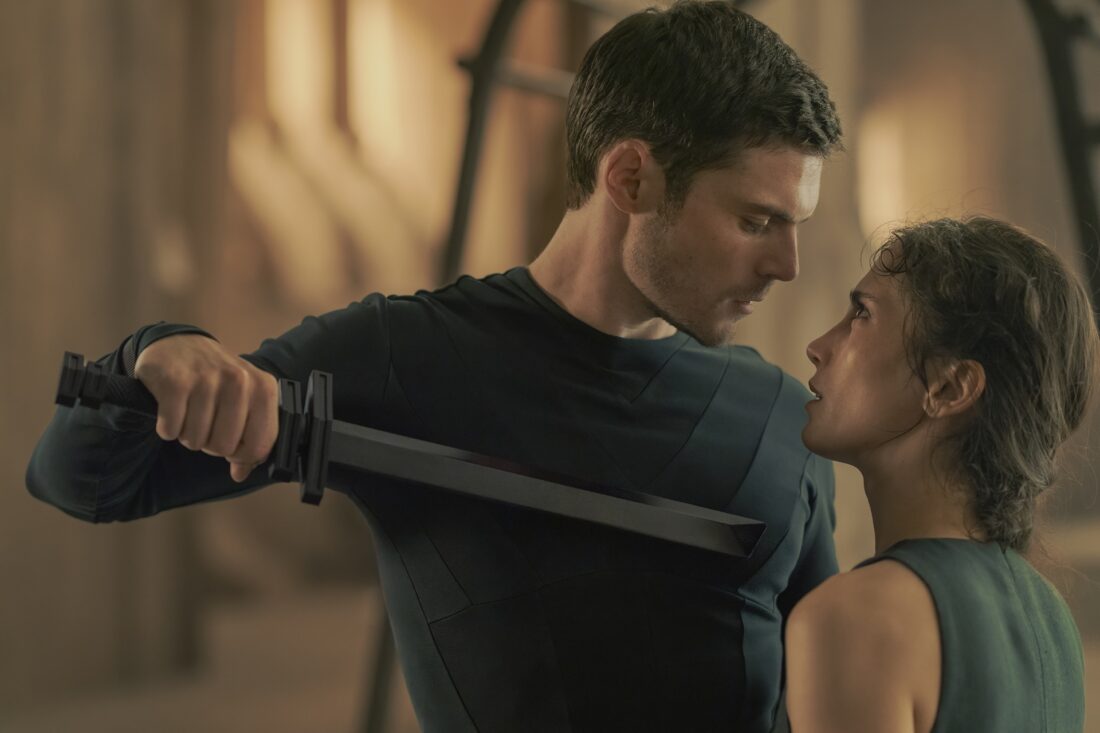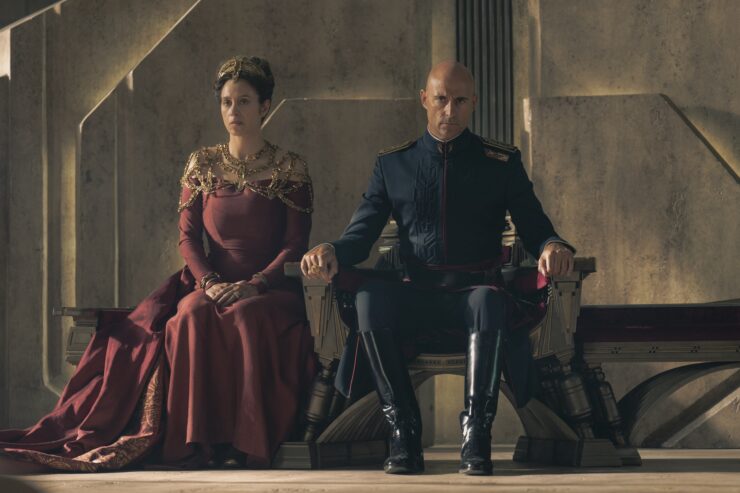We’re back in the film landscape of Denis Villeneuve’s Dune adaptations, this time for a story that takes place ten millennia before Paul Atreides’ rise to power. Welcome to Dune: Prophecy.
Recap

We begin with a massive flashback told from the vantage point of an older Valya Harkonnen (Emily Watson). She talks of the Butlerian Jihad, where humans had to fight against the thinking machines that rose up against them, leading to thinking technology being banished. In the battle, the Harkonnens were said to have fled while the Atreides vanquished the enemy and called the Harkonnens cowards for running. Valya insists that these were lies, and led to her family’s banishment. She eventually joined the Bene Gesserit sisterhood along with her own sister Tula (Emma Canning), and became a favorite of their first Reverend Mother, Raquella Berto-Anirul (Cathy Tyson). Raquella believed that the Imperium needed better leaders, and created the Bene Gesserit breeding program to achieve that end, to the dismay of sisters who Valya calls “zealots.” In her final moments on Wallach IX, home of the sisterhood, the dying Reverend Mother calls for a younger Valya (Jessica Braden). Raquella has a vision of a reckoning and advises Valya to do everything in her power to safeguard the Sisterhood. Valya believes that the Reverend Mother wants her to put one of their sisters on the throne of the Imperium.
When Valya tries to get the rest of the Sisterhood to adhere to this plan, there is a clear faction who do not agree: the zealots who believe that humility is the center of their work, and are led by Mother Dorotea (Camilla Beeput). She means to destroy the breeding index, so Valya stops her using a new technique she has developed: the Voice. When Dorotea refuses to bend to Valya’s plans, she uses the Voice to get Dorotea to kill herself. Thirty years later (116 years after the war against thinking machines and roughly 10,000 years before the events of Dune), the sisterhood is preparing to welcome Princess Ynez (Sarah-Sofie Boussnina) into their ranks following her marriage. Her half-brother Constantine Corrino (Josh Heuston) comes to talk about her accommodations, but Mother Superior Valya is firm about her being treated the same as all the other sisters. Acolytes are working on their ability to spot lies and become Truthsayers under the tutelage of Mother Tula (Olivia Williams).
Constantine arrives home on Salusa Secundus to find Ynez sparring with shield belts against Swordmaster Keiran Atreides (Chris Mason). Emperor Javicco Corrino (Mark Strong) is reviewing the dowry for his daughter with the Duke of House Richese (Brendan Cowell), who is offering him a fleet of warships to help tame Arrakis and protect the spice harvest from Fremen attack. The Emperor takes advice from his own Truthsayer, Reverend Mother Kasha Jinjo (Jihae), and agrees to the Duke’s demands, including their own wing in the palace. The Empress Natalya (Jodhi May) is helping her daughter prepare for the wedding, but is dismayed at her daughter’s choices. Ynez insists that the Sisterhood will allow her to rule with untold skills and that marrying Pruwet Richese (Charlie Hodson-Prior)—who is only nine years old—gives her time to do as she will and learn what she needs. The Empress believes her daughter should rule how she likes and marry whomever she wants, noting Ynez’s affection for their Swordmaster.
The Emperor is informed that Desmond Hart (Travis Fimmel) has come to visit him from Arrakis, a soldier believed dead in the latest attack. Hart tells the Emperor that the attack on Arrakis was not the Fremen—it was insurgents from within the Imperium who stole spice from the harvest. Hart wants an appointment in the palace for his loyalty, and the Emperor agrees to find him a place. Kasha later has a vision involving Ynez in danger and goes to check on her before leaving. Natalya and Javicco argue about Ynez’s wedding, with the Empress reminding the Emperor that he used to listen to her more and have a stronger Imperium for it; the Emperor disagrees with this version of events. Valya and Tula discuss who Ynez should be paired with among their acolytes to make her adhere more easily to the Sisterhood’s views. Kasha arrives and tells Valya and Tula about her vision, worried that their plan might be in error. Valya dismisses her concerns and tells her to rest the night before returning to her post.
The engagement goes forward while Tula argues with Valya about her dismissal of Kasha; she asks for her sister to at least check the match and be certain Ynez is the right sister to have on the throne. After the engagement ceremony, Pruwet pulls a small thinking machine from his pocket that runs through the reception; Hart stabs the thing and the Empress makes to punish the child, while Ynez, the Duke, and the Emperor protect him. Hart gives the machine back to the child, and Ynez tells Pruwet that she’ll kill him if he ever does anything like that again. Valya checks the match and finds that Ynez is the right pick and her match will stabilize House Corrino for centuries, thinking she might have Kasha take some leave; Tula points out that she can’t takes pieces off the board any time they disagree with her. Ynez and Constantine go out together to a spot called Division, and take a copious amount of drugs along the way. Hart finds the Emperor and tells him that his troubles on Arrakis are a symptom of a larger issue within the Imperium. The Emperor admits that while Kasha has never led him astray, he doesn’t like this match, but there’s nothing he can do if he means to keep the Great Houses happy. Hart believes that the gods are listening, and the Emperor insists that if the gods freed him from this wedding, he’d be a true believer.
In Division, Ynez runs into Keiran and offers to share spice with him. They head to the back and sleep together. Late at night, the Emperor wakes and find a disc containing video of the approach of a great worm on Arrakis, about to swallow Desmond Hart whole. Pruwet takes his little machine into the halls at night, and Hart finds him. Pruwet admits he had a bad dream and can’t sleep. He wants to know why Hart is here, since he’s a soldier, but Hart believes that there is a war here: a war being waged by people who want to do humanity’s thinking for them, just as the machines once did. He claims to have been gifted a great power and says that war demands sacrifice—suddenly Pruwet begins burning alive and dies. On Wallach IX Valya and Tula hear screaming and find Kasha in the hall; she is also burning alive from an unknown source and dies in front of them.
Commentary

That opening segment set in the past was a bit unfortunate, I’m sorry to say.
There are more flashback segments coming, per the showrunner and actors on the series, so the choice to open the show with a rote historical explainer and then never return to flashback after the basic setup was incredibly odd. It’s also awkward because the segments taking place when Valya is younger are the point that the Sisterhood of Dune novel encompassed—meaning that despite the show being billed as a story inspired by that book… it’s not really. Most of what we’re about to see is brand new.
And what that leads to is a first episode that is very concerned with making sure you know: This is a Dune story. Like the movies you ostensibly saw and liked. Please recognize this universe and want to hang out here with us for six episodes. See, there are Harkonnens and Atreides and the ruling Corrino House! Look, a fight with shield belts! We gave you some visions with sandworms, and mentioned the importance of spice and Arrakis! There’s a Fremen tending bar! It’s DUNE, okay? We promise it’s Dune.
And it’s all a bit ridiculous that things could be so familiar because this is over 10,000 years before the events of Dune. I know that there’s a level of inference here about the lack of “thinking machines” keeping things stunted and a stagnation of society brought about by the current systems humanity is clinging to. But ten millennia of the same ruling house, the same noble families, the same blood feuds, and a sisterhood that is already practically the same to the one we see in the premiere text? That’s not stagnation, that’s absurdity.
Language and power change constantly throughout history, and here we see none; presumably because the folks in charge of the show need to be certain that the audience would recognize enough to keep them watching. And it’s genuinely nonsensical: There are eleven pharaohs with the name Ramses in Egypt’s history, but despite the length of pharaonic rule (over 3000 years), those eleven sovereigns reined in a span of roughly two centuries. Because change happens quickly and constantly, and even stagnation moves around in the muck as it goes.
There are, in fact, a lot of changes already to the story that was laid down by Brian Herbert and Kevin J. Anderson in their run of Dune books, and they’re all extremely Hollywood choices thus far. For example, Valya Harkonnen didn’t create the Bene Gesserit “Voice” in those novels—she perfected its use, but the skill itself was discovered by Raquella when she became the first Reverend Mother. And yet, it seems the creative team could not resist the chance to make their central character—and a Harkonnen, at that—the one who contributed this all-important facet of Bene Gesserit power. Like ya do.
I’m never a purist in book-to-screen adaptations, and am adamant that ultra-specific adherence to text is often tedious in the extreme. That said, the world of filmmaking does have a tendency to bring out a lot of deep, silly clichés in storytelling, and we’re getting an abundance of them so far: The princess is romantically interested in the Atreides; the prince is a layabout bad boy of sorts; Valya wants to control everything with an iron fist while her sister wishes she would allow for more trust and flexibility; the mysterious solider, of course, comes from Arrakis and is somehow imbued with special murder power. We’ll see where all this leads, but that’s a heavy list right there. Hopefully we’ll wind up somewhere interesting.
There are plenty of high points in all of this, of course. The design of this universe is intricate as ever, from the grand physical sets down to the textured costuming. The actors are a stunning group, with Emily Watson and Olivia Williams acting as firm anchors to every other tether on the board. Their sisterly rapport is an easy highlight of the show so far. Mark Strong is hilarious as an ineffectual Emperor of the Known Universe, just by virtue of how seriously he’s chosen to play the role. There’s also a very slight echo with the original Dune text, an aspect that I felt was entirely undersold in the film version: Duke Leto Atreides’ mistrust of his wife is ultimately what leads to his downfall, and here we have a similar tension between the Emperor and Empress.
But there’s much more to unfold…
Truthsaying and Visions

- I love this set of acolytes we’ve got and am fascinated to see where their journeys lead. (Probably nowhere good, alas.)
- The heavy cues for the use of Bene Gesserit power are a little much. They have to tap their fingers together as though meditating in order to access their truthsaying abilities? Isn’t that kind of a huge tell?
- Sorry, Richese being the family the Corrinos are about to get into bed with is a pretty great joke. Hi, Mr. Emperor, we’ve got Duke Moneypants here to see you about a dowry for your daughter…
- The Sisterhood having those computers is less of an issue in the books because they get destroyed early on, if memory serves. So that’s a pretty significant change, I’d imagine.
Next week is fast approaching…











It’s not just that it’s the same families, they’re wearing the same fashions!!!
For example, the veil/face caul thingy that the Princess is wearing is so totally a callback to the similar chain/face necklace/veil thingy that Lady Jessica wears when she arrives on Arrakis, but that is a specific choice for the place and time – a somewhat culturally insensitive allusion to the face coverings worn by the Fremen that flaunts her wealth and totally misses the point about why the Fremen cover their faces while also serving as a direct signal of her status as Duke Leto’s bound concubine.
Having said all that, it makes NO sense for that to be what the Crown Princess would wear 10,000 years earlier in a different setting and on a different planet in an entirely different milieu.
I thought it was a promising start. Given how dire much recent TV F&SF has been when it doesn’t have an existing story to follow, that’s far more than I was expecting.
The casual disregard for a vast span of time is irritating though. Ten thousand years ago homo sapiens had not yet invented thrown pottery, and sabre-toothed cats had not long gone extinct. Wooly mammoths hung on in a few spots like Wrangel Island and the Yukon for another few thousand years. For there to be no obvious social or technological developments between DP and the Dune books and movies is just silly. That family names and dynasties were to persist for 10,000 years is borderline absurd.
On a more minor level, the audio treatment of the Bene Gesserit Voice was just ropey. My wife is a former school headteacher. I’ve seen her command unthinking obedience from grown men by just turning on her Headteacher Voice. The showrunners need to go listen to teachers stopping kids from running in the corridors!
Oh and in the words of Half Man Half Biscuit, Mark Strong’s got a better frown than Tony Iommi.
The lack of change over 10,000 years is absurd. The related mildly-annoying thing is that it looks like transportation will be happening at speed-of-plot; it’s not really emphasized in the Villeneuve movie(s), but space travel being a huge effort that’s not undertaken easily or lightly is a fairly significant plot point in the Frank Herbert novels.
The other thing that felt slim but maybe it’s just the first episode and will improve: for all of Frank Herbert’s faults, his books are about exploring ideas in interesting ways (even when they’re problematic ideas like gender essentialism). The Villeneuve movie(s) is (are–do we count parts 1&2 as one movie or two?) also full of ideas, which is a thing that makes it/them a successful adaptation. So far the big ideas in Prophecy appears to be “What if we made some more Dune stuff? We heard you like Dune stuff.” Hopefully that changes or improves in the next episodes.
I wasn’t expecting much, but I enjoyed that. The last few minutes even had me going all o.O, and as someone who has read all the books, that excites me. And we got a glimpse of thinking machines! That minute was as exciting for me as those few minutes on Cybertron in Bumblebee. Made me wish this was a Jihad trilogy series, which if you think about it, it would be more helpful than likely this to cover if they want to put the main saga fully on screen.
IIRC, “Richese” is a planet/ ruling family that’s mentioned in the original Dune books.
It is. Richese is no. 2 behind Ix for making cool toys in the Frank Herbert books.
Which, again, unfortunately underscores the silliness of Time! Is! Epic! (But Everything Remains The Same): Richese is obviously still a Marvelous Toys planet 10,000 years before Dune (they make thinking machines and offer the Emperor aerospace power) and whether they’re Number One or Number Two in the Prophecy era doesn’t make much difference; nothing ever changes because the creators are trying to deliver constancy.
I’m not going to lie, my reaction to seeing the Empress was “Behold the Lioness of Cintra!” (Though by the sound of it this particular consort might be just a tad less murderous, though equally burly).
Honestly, I tend to agree that the flashback at the start (and the voiceover throughout) were obvious weak spots in this premiere*: otherwise it was quite interesting, especially Hart the Half-Mad prophet (I’ll bet His Majesty the Emperor would be deeply, deeply sorry his subordinate took that little remark and ran with it, like the knights that slew Thomas Beckett).
Hopefully the show will only improve from here: I am, at least, willing to watch the next episode in order to find out whether this show has more legs than the average sand-worm.
*If only because there’s no room for speculation and ambiguity about the events surrounding the current Boss Sister’s true character and accession to pole position in the sisterhood.
I would totally sh*t myself if the Lioness of Cintra was a multi-universe cross-genre crossover extravaganza if she was the Consort of the Padishah Emperor!
More likely she’s a reincarnation, Eternal Warrior-style.
I’ve never read the books, either the original Frank Herbert novel or the Brian Herbert/Kevin Anderson sequels/prequels. I only saw the Villeneuve and Lynch movies, and the sci-fi channel miniseries that aired over 20 years ago. I also played the 1993 PC CD game made by Cryo that used footage from the Lynch film.
In other words, I had no idea what to expect from Prophecy and I went in cold. I appreciated the opening flashback, but the minute it jumped forward and introduced us to that insane amount of players, it took me a while to get my bearings and get the full picture of what was going on. The only thing that’s clear to me is that Valya Harkonnen is steering the Bene Gesserit towards the darker path we’ve seen in the movies. That’s a long ways off for sure. And I still don’t get what Hart’s motivations are for killing the young prince or how the other sister got affected by that inner fire.
Initially, I was trying to understand how could the story be taking place 10.000 years before Paul Atreides, since I always understood that story took place in the year 10191. It took me a detailed Google search to discover that the books don’t use our western calendar based on AD/BC at all. Their calendar is apparently based on the Guild, which itself is apparently far deeper into the future than I realized. Which of course leads into the issue of Prophecy taking place 100 centuries before Paul. Even middle age in our history only lasted a thousand years or so before society evolved.
I’ve never read more than excerpts of Brian Herbert and Kevin J. Anderson’s Dune books, but I know enough about them to have never been a fan of their Terminator-esque version of the Butlerian Jihad, so seeing it brought to life at the beginning of this episode annoyed me off the bat, I know that’s not fair, since this show is supposed to be inspired by their work. I just wish it’d kept it vague.
I also rolled my eyes at the revelation that Valya discovered the Voice, not because it was a deviation from the source material I haven’t read, but rather because it just felt so out of the blue, and also one of those things this show is already full of that you’re just supposed to know is a big deal going in. It might have worked better if the first episode were mostly set in that past, with hints that Valya was developing this gift, so that when she finally whipped it out, it would have felt more satisfying.
As for the rest of it, I thought it was fine. The fact that this universe looks exactly the same as it will ten thousand years later doesn’t really bother me. I tend to be more forgiving of that sort of thing when it comes to fantasy books/shows/films, and Dune has always felt more like high fantasy to me than science fiction. I do hope the story gives us someone to root for soon, though, because HBO/Max doesn’t need two competing amoral fantasy epics about people trying to seize power.
Given all the negative headlines I’d seen concerning this show, I was hesitant to watch it. But I’m glad I did. I enjoyed it. I admit I too, thought, “They’re really folding in the callouts quick,” as Emmet mentioned. On the other hand, some of them were pretty cool (I suppose those volumes we see the Sisters reading from are copies of the Orange Catholic Bible?); and if one can set aside the absurd lack of change over 10,000 years, it was a solid story, interesting and meaty without being difficult to follow. It’s certainly a visually beautiful show.
I’ll be tuning in for week 2 and hoping it continues to be interesting.
Re: Emperor offers a “…fleet of warships to help tame Arrakis and protect the spice harvest from Fremen attack”
Were the Fremen even on Arrakis 10k years before the events of Dune? I thought they’d come to Arrakis more recently than that, culturally remembering stories of having to leave greener planets, and even cataloguing their migrations in prayers/chants.
I’m familiar only with the plots of the first three Herbert novels; I’ve read the fourth once or twice; but I confess that I haven’t read the original’s historical appendices in quite a while.
Did that Fremen migratory history get retconned in subsequent books? (or is my memory of the timeframe just plain wrong?)
Answers from the web are contradictory, spanning all possible answers: “yes, no, and maybe, but just barely.” One person’s retcon is another’s illumination, I suppose.
In any case, there’s no point in chasing down this rabbit hole in a thread about Dune: Prophecy. I’m tucking my grayhaired headcanon under my jubba cloak and backing away.
After all, it’s just a show-I should really just relax.